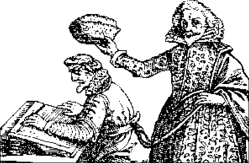Did Shakespeare write Bacon's Essays?
But if Shakespeare was unlearned, how did he come to write plays that seem to have all kinds of learned references in them?
The answer (according to the Baconian Absurdists) was simple: he didn't write them, but allowed his name to be attached to them to allow the real author, formally educated, and of course an aristocrat, to preserve a decent and modest anonymity. In this 19th century illustration by an Absurdist, Shakespeare is showing who really wears the hat. Once the idea had been broached that the plays were written by someone else, there were many other claimants.
The logic of snobbery
Lord Bacon of Verulam was an ideal candidate. He was undoubtedly learned, and what is more, was of the very highest social status--a much more palatable state of affairs than to have the language's greatest poet the son of a mere glover, born in seeming obscurity.
Once the suggestion had been made that Shakespeare did not write his plays, all kinds of improvements were made on the original theory. Bacon became the hush-hush son of Queen Elizabeth and Leicester, thus giving him even more credibility as a writer, and there were many more claimants to the plays: in recent years the Earl of Oxford* has had staunch advocates, but other candidates have included Queen Elizabeth herself, Christopher Marlowe (who didn't really die in a tavern brawl in 1593), and so on.
What kind of plays might Bacon have written? Click here to read more.*
So who did write the plays (and does it matter?)
To begin with, we read and perform the plays, not the author, so in one sense the name of the author is of secondary interest. There are, however, two thing we can learn for certain from the plays about the author: he was a voracious reader, and he was a man of the theatre. The author did not need to travel to write plays in Italy. Most authors of the period set their plays in exotic places for effect, and were far too poor to travel. So they got their information from books. Shakespeare, the son of a middle-class Alderman of Stratford, would have had a good basic education, and, like most of his contemporary dramatists, would then have read widely.
It is also clear from the stage history of the plays, so much performed four hundred years after being written, that the author knew how to write for the theatre, and understood dramatic writing from the inside. None of the non-Shakespearean claimants had any experience in the theatre. Shakespeare did, as we know from many documents that have survived.
You be the judge.
Footnotes
-
The truth is out there
Edward de Vere, Earl of Oxford, has many followers. There is an Edward de Vere Newsletter that appears regularly, devoted to articles discussing the Earl's claims to have written the plays, and a well-maintained website devoted to issues of his "authorship." The fact that the Earl died in 1604, well before most of Shakespeare's finest plays were written, is an opportunity for much argumentative ingenuity.
-
What if. . .?
Those with highly formal education in the period often tended to write more formal plays than Shakespeare and most of his peers--Ben Jonson's tragedies are a good example.
Bacon (or the Earl of Oxford, or other noble pretenders) might have been more pedantically concerned to be neo-classical in their plays, less inclined to exploit the variety and colour of the native dramatic traditions.
